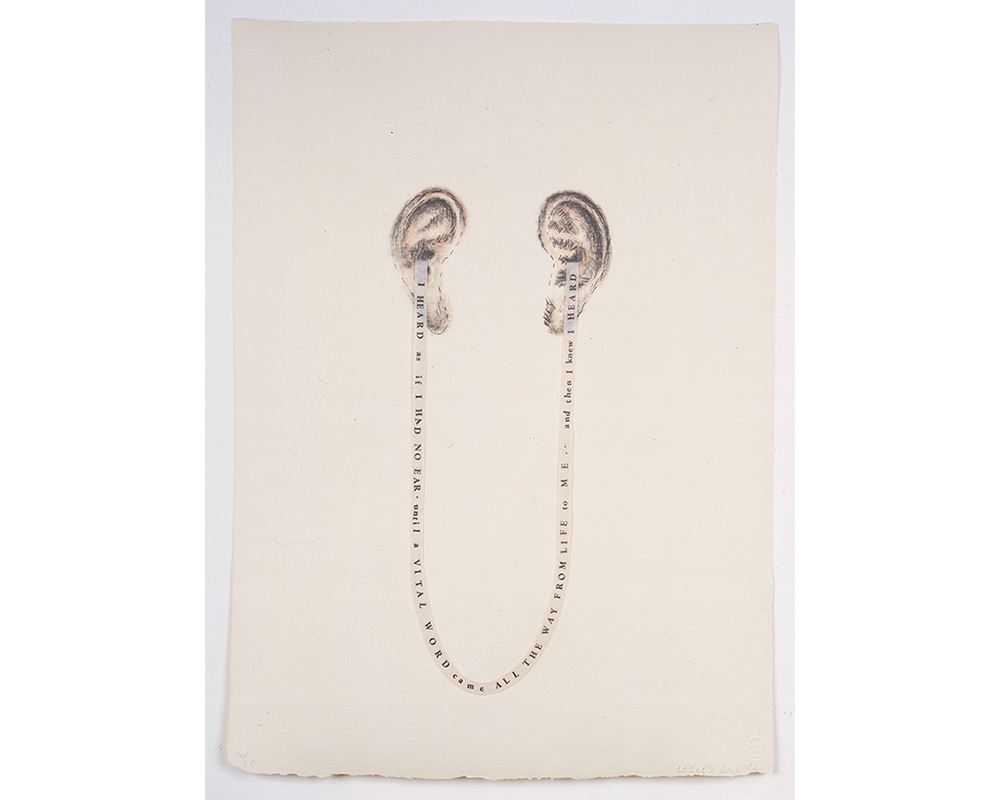
Poems and Prints: On What the Ear Carries
Indigo Casais ’23 is an art history and English double major and a student assistant in the Cunningham Center this summer. Poems and Prints is a series of blog posts exploring thematic connections between written and visual expression. In this post, Indigo discusses Lesley Dill’s print The Poetic Body: Poem Ears and Mosab Abu Toha’s poem “Things You May Find Hidden in My Ear.”
Things You May Find Hidden in My Ear
By Mosab Abu Toha [1]
For Alicia M. Quesnel, MD
I
When you open my ear, touch it
gently.
My mother’s voice lingers somewhere inside.
Her voice is the echo that helps recover my equilibrium
when I feel dizzy during my attentiveness.
You may encounter songs in Arabic,
poems in English I recite to myself,
or a song I chant to the chirping birds in our backyard.
When you stitch the cut, don’t forget to put all these back in my ear.
Put them back in order as you would do with books on your shelf.
II
The drone’s buzzing sound,
the roar of an F-16,
the screams of bombs falling on houses,
on fields, and on bodies,
of rockets flying away—
rid my small ear canal of them all.
Spray the perfume of your smiles on the incision.
Inject the song of life into my veins to wake me up.
Gently beat the drum so my mind may dance with yours,
my doctor, day and night.
What is the relationship between hearing and learning? Between hearing and remembering? The ear is an important part of how many people take in information about the world around them. Whether we realize it or not, our deepest and most visceral memories are often tied to sound. In these selected works, artist Lesley Dill and poet Mosab Abu Toha explore connections between language, memory, and sound.
In her print The Poetic Body: Poem Ears, Lesley Dill considers the relationship between the human body and language. The words strung between the two ears are taken from an Emily Dickinson poem and read: “I heard, as if I had no Ear Until a Vital Word Came all the way from Life to me… And then I knew I heard.” Although Dill's print is, of course, a work of visual art that requires us to read the text using our eyes, it also nods to the importance of hearing in processing language. The two ears hold up the words, becoming the poem’s entry point into human consciousness and showing the crucial part hearing plays in making sense of ideas.
Palestinian writer Mosab Abu Toha also tackles the connection between hearing and knowledge in his poem “Things You May Find Hidden in My Ear,” which focuses on how sound can evoke powerful memories. The poem, which is broken into two distinct sections, is told from the perspective of a patient having his ear examined by a doctor. In the first section, the poem highlights the positive memories tucked away in the narrator’s ear: his mother’s voice, Arabic songs, his favorite poems. The second section, on the other hand, reveals the noises his ear carries of Israeli attacks in Palestine—sounds of drones, bombs, and rockets.
Toha’s poem highlights the complexities of sound-based memory: it is a visceral form of remembering, and so, we do not get to pick what enters our consciousness. Some of these noises are ones the narrator asks the doctor to handle carefully, wanting them to be treated as precious artifacts; others he wishes to forget, instructing the doctor to “rid [his] ear canal of them all” (line 16). But alas, the narrator has no choice but to hold space for all of these sounds, the good memories and the bad ones, within him.
What’s more, as Toha noted in a 2020 interview, Palestinians carry an especially heavy burden in terms of memory; most of their official archives and historical documents have been stolen due to extensive Israeli looting. [2] Hearing is the only way for the narrator to recall these memories—memories of his loved ones, his losses. The memories that make him who he is. Nobody else will hold onto these memories for the narrator; this history is not guaranteed to be documented.
While Dill’s and Toha’s works are very different, both convey the care and attention inherent to hearing. Hearing is a subtle, underrecognized act. In Toha’s case, it is also a revolutionary one. To hear is to remember: to remember the pain, the violence, the poems, the singing, the love. To hold onto those moments which others hope we will forget. To make physical space for them in our bodies. To cradle them, gently.
To read a more recent reflection by Toha on the Israeli occupation of Palestine, in which he returns to the connection between hearing and memory, see Mosab Abu Toha, “In Gaza, It’s Now Time to Count Our Family Members,” The Nation, May 24, 2021, https://www.thenation.com/article/world/gaza-israel-safety/.
[1] Mosab Abu Toha, “Things You May Find Hidden in My Ear,” Poetry Foundation Magazine, March 2021, https://www.poetryfoundation.org/poetrymagazine/poems/155510/things-you-may-find-hidden-in-my-ear#:~:text=Mosab%20Abu%20Toha%20is%20a,in%2Dresidence%20at%20Harvard%20University.
[2] Mosab Abu Toha, “To Be the Poet of Troy: An Interview with Mosab Abu Toha,” interview by Philip Metres, Literary Hub, July 22, 2020, https://lithub.com/to-be-the-poet-of-troy-an-interview-with-mosab-abu-toha-by-philip-metres/.